January 13, 2021 at 3:32 pm
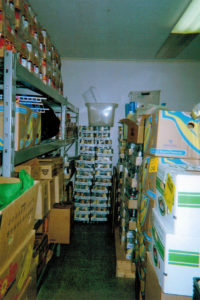
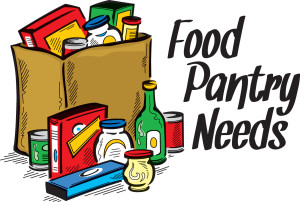
Actually, there are literally thousands of foods which are good for a food drive. Choose the foods that make eating easy.
Many food drives and food distribution activities are springing up throughout our country. Thank Goodness!
People are shopping at food pantries and food distribution centers in greater numbers than ever before. People who never, ever, even paid attention to food pantries now find themselves in lines.
We have now reached the point where we all have choices: If we don’t need to shop at a pantry, then we need to give food to a pantry.
So, then, the question: What are good things to give?
The answer: any foods which make eating easy.
Breakfast foods include:
cereal, granola, granola bars, protein bars, shelf stable milk, juice.
Lunch foods:
peanut butter, jelly, canned fruit, canned pasta, tuna, mayonnaise, and catsup.
Dinner:
pasta with sauce, taco kits, canned soups, stews, canned beans, macaroni and cheese, canned tuna, salmon, sardines, chicken.
Staples:
People shopping at a food pantry also need items such as salt, pepper, sugar, seasonings, cooking oil, mayonnaise, mustard, catsup, paper towels, paper napkins, forks, knives, spoons. Is there an item that you use regularly, maybe that item will be good for a food pantry gift.
Items of Dignity:
soap, shampoo, laundry soap, dishwashing soap, sanitary napkins, toilet paper. toothpaste, tooth brushes. razors
Infant needs:
diapers, baby soaps, baby lotion, baby foods
Pet needs:
pet food, both dried and canned; cat litter, puddle pads, gently used pet beds, leashes.
Homeless needs:
food that does not need refrigeration, food that can be distributed in single servings



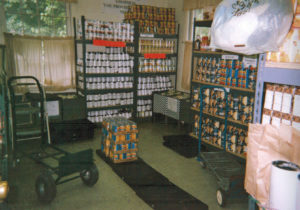
Thank you for reading this blog post. Please refer it to your preferred social media network.
Thurman Greco
January 6, 2021 at 7:47 pm

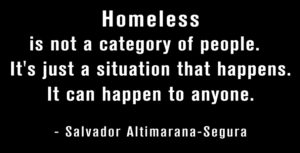
If you read my last post – “Food Pantry Rules” – you may have thought you were in some time warp. Travel had returned you to about 2010.
Well, not really.
The pandemic changed many details but the bones of a food pantry event are the same.
The volunteers and the people who shop at the pantry are the same.
Everyone comes together looking for groceries but often, they want and need far more.
Food pantry lines get longer every pantry day because people, families, struggle with change they didn’t ask for.
They are rewriting their destiny stories without a road map or instructions.
A number of people in the food pantry, both shoppers and volunteers, didn’t know about food pantries until circumstances set up a situation where they suddenly looked around and realized they were in a car in a long line waiting for food.
There is a name for this category: SITUATIONAL POOR.
A person fits into the situational poor category when she lands in a situation created by an event such as a hurricane, fire, flood, pandemic, or other disaster which destroys the home, car, job.
Food pantries offer much – peace, community, spiritual connection, groceries.
A food pantry in the basement of a church is a cross between a church and a busy pizza place.
A food pantry in a line of cars in a pandemic is reminiscent of the mass food distributions we held periodically in New York State after the collapse of the economy in 2008.
A line of cars filled with people needing food wraps around the block, down the road, and even further.
A whistle blows.
The cars begin to move. A volunteer puts a bag (s) of food in each vehicle.
Everyone wears masks.
There are still food pantries where people show up to a church and receive a bag of groceries.
But, whether the food is distributed to hungry people in cars or to hungry people walking to a building, a food pantry distribution is not a program. It is a community made up of those who gather the food and distribute it, and those who receive it. The process of distributing the food to people creates a change in everyone.
The experience does not heal a person. Nor does it change the story. It does not offer therapy. The experience itself is a conduit for each person’s own spiritual growth and change.
Never once when I was involved in a food pantry did I kid myself into thinking that I was winning the war against hunger. And, I do not kid myself now.
I know this food pantry food distribution experience does not end hunger. Instead, it offers food for several meals. And, that is all.
Ending hunger is another matter altogether.
I do feel, though, that the rules are changing. The pandemic experience is altering the hunger situation dramatically, at least. The pandemic experience is altering the hunger situation permanently.
“How is that?” you ask.
The pandemic has changed how our food is grown and distributed. Food pantries are a link in the food distribution chain. This chain now looks different. The link connections are different.
“How is that?” you ask.
For one thing, the restaurant industry is different.
Food production and distribution is different.
I do not think we know yet just what the fallout is. We have yet to live out the end of this story. We’re living and experiencing the future. For some, it is hard to see the big picture because the changes have not yet come around for each of us to see and experience in our daily lives.
In any event, the Pandemic is not us what we think. Our opinions and preferences don’t count for much here.
One thing is certain, our future is destined to be different from a future without a Pandemic. Another thing is certain for me: We can never return to our past.
We are all destined to experience a new Pandemic future.
Whatever the future brings, we need to keep on feeding the hungry in whatever way that works.
Thank you for reading this blog post. Please forward this article to your preferred social media network.
Share it with your friends.
Thurman Greco

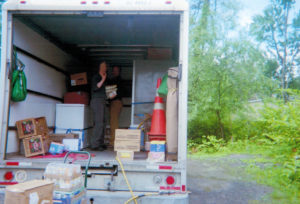

January 5, 2021 at 8:53 pm

A food pantry is what it is because of three things:
the economic situation at the moment
the volunteers
the people who shop there.
The people come together looking for groceries but often, they want and need far more.
While the coronavirus pandemic rages, the food pantry lines get longer every pantry day because people, families, deal with change they didn’t ask for.
In short, they are rewriting their destiny stories without a road map or instructions.
A number of the people in the pantry, both shoppers and volunteers, didn’t know about food pantries until circumstances set up a situation where they suddenly looked around a room and realized where they were.
There is a name for their category – SITUATIONAL POOR.
A person fits into the situational poor category when s/he lands in a situation created by an event such as a hurricane, fire, floor, pandemic, or other disaster which destroys the home, car, job.
Pantries offer much – peace, community, spiritual connection, groceries. I always think of a food pantry in the basement of a church as a cross between a church service and a busy pizza place.
A food pantry, and those connected with it, are not a program. They are a community. As volunteers, all we really do is open the door. As all the hungry people walk through the door, they undergo a change somehow.
Each person in a pantry, in whatever capacity, has experienced rejection in some way – too young, too old, too crazy, too sick, too poor, not poor enough.
The food pantry experience does not heal a person, nor does it change the story.
The food pantry experience does not offer therapy.
The food pantry is, instead, a conduit for each person’s own healing.
FOOD PANTRY RULES
Sign your name in the register as you enter the pantry.
Find a place in line.
Do not crowd or block the door to the pantry room.
No more than 2 shoppers are allowed in the pantry at one time.
No more than one new shopper is allowed in the pantry at one time.
Shop for a three-day supply of food for everyone in your household.
Place your selections on the table as you shop.
Respect the restrictions on certain foods.
Finish your shopping in 10 minutes.
Once you begin to bag your groceries, do not continue to shop.
Because the food availability is different each time you shop, it is best to visit the food pantry weekly.
Thank you.
Thurman Greco
P.S. The rules may be different at the pantry where you shop. Each food pantry is different. The space is different. The times the pantry is open is different. The management is different.
These specific rules were used in the food pantry I managed where the people were many, the space small, and the hours few.
Please forward this article to your preferred social media network.
Share it with your friends.
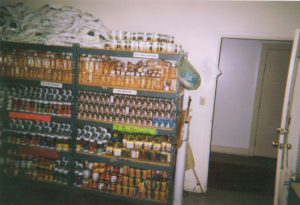
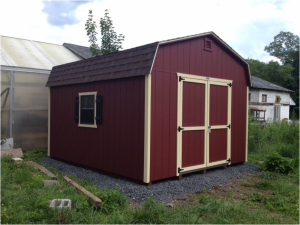


December 21, 2020 at 11:09 am

December 21st is the Winter Solstice for 2020.
The Winter Solstice is the annual celebration of the yearly rebirth of the sun.
Please take a few moments today to send healing, acceptance, regeneration, and rebirth to all living beings – both plant and animal.
Visualize a world in which all living beings have enough food and water to nourish themselves into wellness in 2021.
Take a moment to release those things which no longer positively serve our planet and its inhabitants.
Find a few minutes sometime today to reflect on our planetary needs. Reflect on how it will feel to live on a healthy planet where all beings experience wellness and coexist to honor and support one another.
Thank you for your healing thoughts and prayers.
Thurman Greco
Please forward this meditation to your preferred social media network.
Share it with your friends.



November 29, 2020 at 8:20 pm

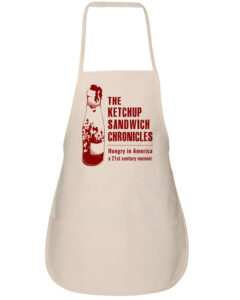
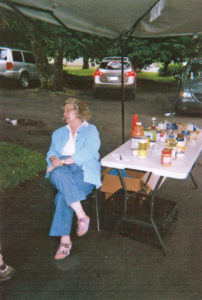
I got excited!
A letter from the Capital City Rescue Mission sent me a thank you note! Just 2 weeks ago, they sent me an appeal letter, complete with return envelope.
And, today, I got a letter from Covenant House.
So what, you say.
Well, so that. That’s what!
When I managed the local food pantry here in Woodstock, I sent out appeal letters every year to a few thousand people. I never, ever, saw an appeal letter from another food pantry or soup kitchen or halfway house.
My letters weren’t nearly so nice as the ones I got from the Capital City Rescue Mission or Covenant House.
The pantry appeal letters were hand addressed, printed on a copy machine and hand folded.
Our return address on the envelopes appeared compliments of a volunteer hand-stamping each one individually. A volunteer got the return address stamp at the Catskill Art and Office for less than $25.
Our mailers went out each year reeking of poverty. No professional letterhead. No nice paper. They were just an appeal from a group of people who needed to keep going from day-to-day.
But, they worked. Those letters and the follow-up thank-you notes brought in enough money to meet our needs. We always had enough for gas and sandwiches for the staff on the monthly food pantry stocking day.
When Guy dented the fender in his car in our parking lot, we had the money for repairs.
When we showed up in the food pantry one day to distribute food, there were no working lights in the basement of the church.
I never quite figured out what happened. But this I do know: Richard Spool arrived in just a few minutes and dealt with the problem. We had enough $$$ to get all the parts we needed at Houst.
And, this I do know: The hungry people were fed, the lights were fixed, Richard saved the day, and the account still had a few dollars left.
But, now, back to the story.
Well, today I did. The appeal mailer came in about 2 weeks ago and I quickly sent a check and a copy of my book (for encouragement).
Today I got a thank-you with another self-addressed envelope from the Capital City Rescue Mission. (I think I’ll send another copy of my book for them to share. ) I’m going to send along another check. I’m anxious to see how this plays out.
Meanwhile, if you are a food pantry, soup kitchen, halfway house and need money, you can learn all my secrets starting on page 196 of my book, “I Don’t Hang Out in Churches Anymore”. I held nothing back. If you read this information, you’ll have the recipe for fundraising success.
In my heart, I want every pantry, soup kitchen, and halfway house to be rich enough to feed everyone who needs the food. I want the food to be top quality – the best.
And, I want every pantry to have enough $$$ to fix the cars and trucks and the lights in the building.
I learned these secrets at Rowe in Vermont when Kim Kline gave her annual talk.
If you feel you can’t take my word for all this success, get Kim Kline’s books and read them. Or, better yet, attend one of her weekends (when the pandemic is over).
Remember, in our country, there is no excuse for anyone to go hungry.
If you’re reading this post and you don’t work for a pantry or soup kitchen, you don’t have to wait for a mailer. All you have to do is contact a food pantry and make a donation.
You don’t have to send a check. If you want, you can hold a food drive and then haul over all the food you gathered. The important thing is that there are many ways to support those who feed the hungry.
And, lately, there are more and more hungry people than we ever thought possible. Your help and support will be appreciated.
Thank you for your generosity and thank you for reading this article.
If you liked this blog post, please refer it to your preferred social media network.
Thanks again!
Thurman Greco
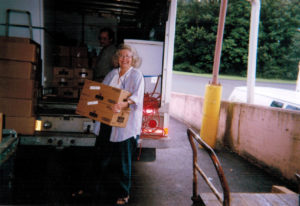




September 7, 2020 at 11:02 pm
INTRODUCTION –
There aren’t many books about there about hunger in America. Whenever I think of books about food pantries, the first writer I think of Sara Miles.
Well, it turns out that Sara Miles has a special friend, a writer friend.
I found Anna Woofenden’s book, “This is God’s Table” by accident on a table at the Barnes and Noble store in Kingston, New York. If only I could give copies of Anna Woofenden’s book to everyone. And, I mean everyone, including you.
————————————
Anna Woofenden started a Garden Church without walls in a vacant lot on 6th Street in San Pedro, California.
Anna placed a cedar stump table in the center of her worship space and consecrated it when she anointed it with oil.
From that moment, people joined her as they gardened, worshiped, and ate together weekly. All were welcome at God’s Table.
Whenever everyone is welcome, they all come. This welcoming, worshiping, and eating together attracts the old and the young, the housed and unhoused, the rich and the poor, and everyone in between.
I invite you to get a copy of Anna Woofenden’s book, “This is God’s Table”, and read it.
You can connect with her at https://www.AnnaWoofenden.com.
Again, thank you for reading this blog post.
If you liked this post, will you please forward it to your favorite social media network?
You can connect with me on Facebook.
Thanks again!
Thurman Greco


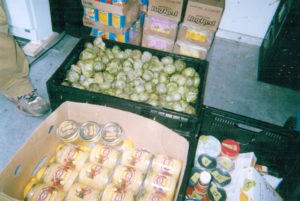
August 19, 2020 at 1:50 pm
 .
.
I got an email survey question yesterday.
“Did your landlord reduce your rent?”
Somehow, I can’t get this question out of my head. It just keeps grabbing my attention at every opportunity. What a question!
The answer is “NO!”
No landlord has lowered anyone’s rent in this area. Rents are going up, up, and up. In fact, rents are disappearing.
My landlord is evicting my neighbors. They live in one half of the duplex next door. The other side is air bnb…or maybe vrbo…or any one of several other vacation rental apps so popular on everyone’s computer and phone.
Until last year, both sides of the duplex were vacation rentals. Then, the town supervisor cracked down on them so the landlady made one side a monthly rental.
Immediately, a lovely young couple moved in. They are the perfect tenants. No noise, no clutter, no smells, no noisy children. Their footprint is the smallest they can manage.
Well, small footprint or no footprint, their days are numbered.
I see them packing up their possessions and driving them away – a few cartons every day. The boxes are going to a storage unit until they can find a new place to live. So far, they’ve had no luck.
They want to stay in Woodstock because this is their home town. Growing up, Gaby skated and bicycled on every street in this town.
Well, there are no places to rent in this town. Woodstock is a vacation rental town all the way.
This lovely young couple seeks shelter in other communities: Palenville, Catskill, Athens.
Meanwhile, the landlord eagerly advertises both units as vacation rentals. The young couple must go. His list of eager vacationer applicants is long. He’s sorry the young couple has no home.
But, life must continue.
Thank you for reading this article.
Please refer it to your preferred social media network.
Thurman Greco
Woodstock, New York
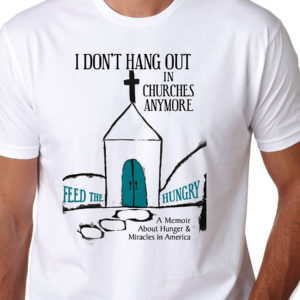
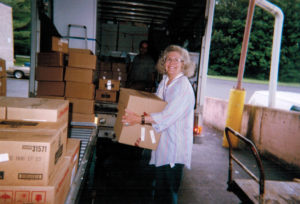

May 19, 2020 at 11:29 pm

Miracles happened in the food pantry. It took me a while to realize this and then it took another while to accept that such a thing could happen in the basement of a small town church in Upstate New York.
I sneaked miracle stories in on the blog posts. I sneaked them on the pages of “I Don’t Hang Out in Churches Anymore”. Finally, I gave them their own pages – as much as I had the nerve for anyway, in a short book “Miracles”.
Research on miracles taught me some things.
I learned that miracles often include weeping statues, broken legs healing straight, relics, stigmata, and visions. The pantry miracles included none of those things.
Our miracles never really cured anyone. I never saw a statue weep, and no one came down with stigmata.
Instead, they showed us all how to grow and love and forgive. It was giving away the food that was the tip off for me.
As far as I can tell, the food pantry miracles were not the result of prayer.
God just showed up and brought food. Once he came disguised as a fireman. Each miracle was a complete surprise, a unique and different event. God came when the pantry shelves were bare and the lines were long.
I don’t think the miracles proved that any of the shoppers or volunteers were more faithful than anybody else in town. Frankly, I think that some of us saw the miracles as coincidences or something.
However they were seen, these events made an impact on a small number of people who saw them as they happened.
The clincher for me occurred when I finally realized and accepted a few basic things:
Carloads of food never showed up when we didn’t need it.
Boots never appeared on the shelves disguised as toothpaste in the summertime.
Nobody ever brought a handful of nails to fix the barn when the wall wasn’t falling.
Two books appeared on my desk out of the ethers: “Miracles” by Tim Stafford and “Looking for a Miracle” by Joe Nickell gave a feeling of legitimacy to my thoughts and memories.
Because of Tim Stafford, I wrote my book entitled “Miracles”. He was direct about a few things – one of them being that people should not spread “miracle gossip”. Because of his feelings about what he called “miracle gossip”, I’m compelled to relate the pantry miracle stories.
To sneak them in blog posts does not do them justice.
Thank you for reading this blog post. Please refer it to your favorite social media network.


Thurman Greco
April 14, 2020 at 11:09 pm

SITUATIONAL POOR – A person fits into a situational category of poverty when s/he lands in a situation created by an event such as a hurricane, fire, flood, pandemic, or other disaster which destroys the home, job, car.
Food pantries, food banks, soup kitchens are overworked in today’s pandemic world. The line of hungry people grows every time the place opens.
It’s bad enough that the line grows weekly. But, worse, many people in the line are confused, afraid. The never thought they would find themselves in a food pantry line with hundreds of other hungry, confused, afraid.
How should they act? What should they do?
What do they do with the food, once they get it home? It may be good food – both delicious and nutritious. However, it may not be anything recognizable. More often than not, pantry food doesn’t come with recipes. Super markets carry thousands of items. Food pantries carry maybe 50 different items and the labels on the cans and boxes aren’t even recognizable. The fresh produce may be organic but not be labeled as such.
So, now that the pantry food is in its new found kitchen, there is a big adjustment period involved in getting it to the table.
We are not so far removed from those people in the food pantry. They are our neighbors, friends, co-workers, relatives, classmates.
And, truth be told, we are all confused, and afraid.
Even though you may not be in the line, there are definitely things you can do. For starters, send a check to a food pantry, soup kitchen, or food bank in your area. If you don’t know where to send the check, look up an organization called:
Feeding America.
Feeding America is glue holding the food pantry world together. If that doesn’t work for you, search out: Regional Food Bank of Northeastern New York.
The Regional Food Bank of Northeastern New York, along with the Food Bank of the Hudson Valley, do an amazing job of making delicious, nutritious foods available to those who need it most.
These two food banks are only two in a large network of food banks located throughout the country. If you seeking a feeding facility in another part of the country, these organizations can guide you to one in the area best for you.
If you are uncomfortable sending money, this might be a good time to organize a food drive.
I wrote three action guides which list suggestions and options which are easy-to-understand and read. You can get these action guides free. Email me your mailing address and I’ll get your copies in the mail right away. I’m not even charging postage and handling.
Email me your mailing address to thurmangreco@gmail.com.
The guidelines and suggestions are practical. I feel confident you’ll discover practical things you can do to help on one of the action guides.
Thank you for caring.
Thanks for reading this article. Please refer it to your preferred social media network.
Thurman Greco
Woodstock, New York


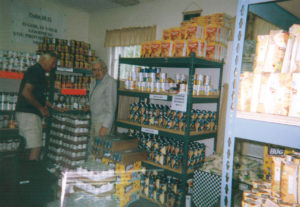
March 28, 2020 at 7:34 pm
“Woodstock is completely packed with Coronavirus refugees from Brooklyn. We’re doing more business here in the post office than we have every done. This post office is busier than any Christmas rush has ever been.”
What a day!
I got a call from someone earlier today. “The food pantry is closed, Thurman. How can this happen?” As I went by the Woodstock Library, I saw a sign: “Closed”
The Coronavirus affects us all. We cannot avoid the reality. People jokingly call our community Brooklyn North.
As long as you have a car and money and an apartment and a cell phone and a computer, all you have to worry about is the spread of germs. But, that’s not how it is with everyone. Without a car and money and an apartment and a computer and a call phone, your life tells a different story.
Without those luxuries, your lifeline requires a food pantry and a library.
The library is essential because it’s your ticket to information about food, housing, and anything else you need to find. A library will help you find everything you need to survive. And, while it’s giving you information, a library roof keeps you dry. The walls of the library keep you warm and comfortable while you seek all that you need.
And, of course, the library has one other luxury people don’t talk about much: a bathroom. If you are without food and a roof and a computer and a cell phone, a bathroom is essential.
So, while the Woodstock Reformed Church has closed its doors, most of the food pantries in New York state are figuring out how to get food to people. They are receiving support from the Food Bank.
In fact, the Food Bank of the Hudson Valley reports that volunteers are responding to every emergency request received. This includes food deliveries to seniors, quarantined and high-risk individuals, school back pack programs.
If you can get to a phone, there are a couple of phone numbers you can call. Try 845-399-0376 or 845-633-2120.
Sources tell me that many food pantries and soup kitchens are not closed. I truly hope you can find one.
So, what can we do? Well, for starters, try to contact people you know but seldom see and find out how they are doing. Do they need anything? Is there anything you can do?
Contact food pantries and soup kitchens in your area and see if they need anything. My bet is that they do. My bet is they need food.
Times are serious. Your help is needed!
If you run out of ideas, contact me at thurmangreco@gmail and I’ll send you, free of charge, my three action guides with practical tips for fighting hunger and homelessness.
Thank you for reading this article. Please refer it to your preferred social media network.
Thanks again!
Thurman Greco













 .
.















